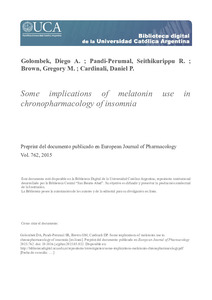Por favor, use este identificador para citar o enlazar este ítem:
https://repositorio.uca.edu.ar/handle/123456789/1459| Título: | Some implications of melatonin use in chronopharmacology of insomnia | Autor: | Golombek, Diego A. Pandi Perumal, Seithikurippu R. Brown, Gregory M. Cardinali, Daniel Pedro |
Palabras clave: | MEDICINA; RITMO CIRCADIANO; SUEÑO; MELATONINA; INSOMNIO | Fecha de publicación: | 2015 | Editorial: | Elsevier | Cita: | Golombek D. A., et al. Some implications of melatonin use in chronopharmacology of insomnia [en línea]. Preprint del documento publicado en European Journal of Pharmacology. 2015, 762. doi:10.1016/j.ejphar.2015.05.032. Disponible en: https://repositorio.uca.edu.ar/handle/123456789/1459 | Resumen: | Abstract: The last decade has witnessed the emergence of new chronopharmacological perspectives. In the case of sleep, accumulating evidence suggests that even a minor dysfunction in the biological clock can impact upon body physiology causing increases in sleep onset latency, phase delays or advances in sleep initiation, frequent nocturnal awakenings, reduced sleep efficiency, delayed and shortened rapid eye movement sleep and increased periodic leg movements. Thus, restoration of the adequate circadian pattern of by proper sleep hygiene, targeted exposure to light and the use of chronobiotic drugs, such as melatonin, which affect the output phase of clock-controlled circadian rhythms, can help to recover the sleep-wake cycle. The optimization of drug effects and/or minimization of toxicity by timing medications with regard to biological rhythms is known as chronotherapeutics. While chronotherapeutical approaches have been particularly successful in the treatment of hypertension, allergies and some forms of cancer, a time-dependent pharmacological approach can be also effective when dealing with sleep disruptions like insomnia. A large proportion of patients under benzodiazepine (BZD)/Z drug treatment fail to achieve a complete and sustained recovery and are left with residual symptoms, like tolerance or dependency, that make relapse or recurrence more likely, and poorer quality of life a reality. Thus the chronic and extensive use of BZD/Z drugs has become a public health issue and has led to multiple campaigns to reduce both prescription and consumption of BZD/Z-drugs. This short review discusses available data on the efficacy of melatonin to reduce chronic BZD use in insomnia patients. | URI: | https://repositorio.uca.edu.ar/handle/123456789/1459 | ISSN: | 1879-0712 (online) 0014-2999 (impreso) |
Disciplina: | MEDICINA | DOI: | 10.1016/j.ejphar.2015.05.032 | Derechos: | Acceso Abierto | Fuente: | Preprint del documento publicado en European Journal of Pharmacology Vol. 762, 2015 ISSN 1879-0712 (online) ISSN 0014-2999 (impreso) |
| Aparece en las colecciones: | Artículos |
Ficheros en este ítem:
| Fichero | Descripción | Tamaño | Formato | |
|---|---|---|---|---|
| some-implications-melatonin-chronopharmacology.pdf | 586,96 kB | Adobe PDF |  Visualizar/Abrir |
Visualizaciones de página(s)
221
comprobado en 30-abr-2024
Descarga(s)
810
comprobado en 30-abr-2024
Google ScholarTM
Ver en Google Scholar
Altmetric
Altmetric
Este ítem está sujeto a una Licencia Creative Commons

